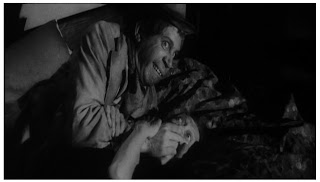Tuesday, October 26, 2010
British Horror Film presents: Circus of Horrors (1960)
Thursday, October 21, 2010
(Obviously)
Monday, October 18, 2010
British Horror Film Presents: The Fearless Vampire Killers or: Pardon Me, but Your Teeth Are in My Neck (1967)
Sunday, October 17, 2010
Going Shopping: Blood from the Mummy's Tomb


The Two Daughters
 The Two Fathers
The Two Fathers
While the savant-father, and his various colleagues on the expedition, seem to belong firmly to the Edwardian, the exception is Corbeck (played by James Villiers). Camply seductive counter-figure of the perverse father, he 'seduces' Margaret into becoming what she is, as he regards Tera not as evil, but as a female unbermensch 'beyond good and evil'. A very British Charlie Manson, Corbeck channels Nietzsche in his desire to escape the shackles of bourgeois morality.
Tera/Margaret sees herself as the reincarnation of love, all suggesting the 'evil' of hippie amoralism threatening to return from the cosmic Egyptian past in a 'new age' apocalypse of wanton libido, not confined to a father waiting until his daughter is 21 before he is able to become her servant (Margret already has a de rigeur 'cool' 60s boyfriend, who 'Tera' offs in his sports car with a useful tree ram).
Margaret / Tera refers to the collection of the various (crappy) tomb-objects required for her reincarnation as 'going shopping' - a deadly male fantasy of female consumption ('I'm going to kill you'). Of course, in the final ritual for the bringing to earth of Tera's age of cosmic love/evil father and daughter ally to kill Tera. This literally brings the house / basement down. The final scene has Margaret as the mummy - not Egyptian but the biopolitical 'mummy' of bare life, the bound figure of feminine jouissance. As a nurse helpfully explains, she has no name because she has no family and all the others were crushed in the collapse.
Beyond the paternal function, at least in the imagination of Hammer, lies not the libidinal terror of the antinomian promise of 'liberation' but the new shackles of the life drive as inexpressible horror of bound libido. 1970s film would play again and again with the topos of rape as discipline. Here the binding is literalised, as the 'mummy' (and the mother's death in Margaret's moment of birth was the condition of her binding to the father), against the threat of some 'naming' and libido not propped on the father.





